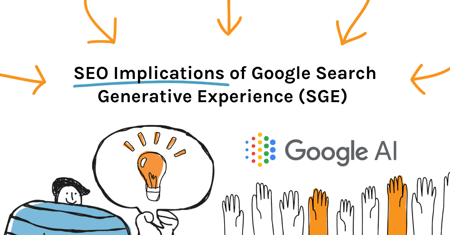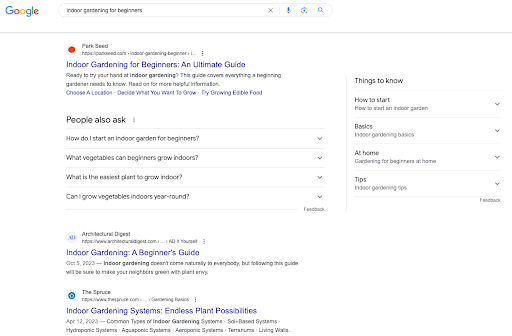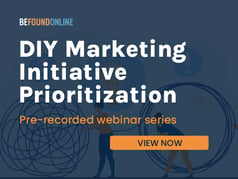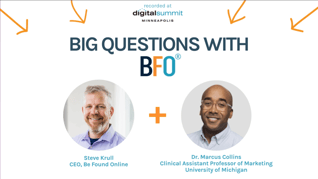SEO Implications of Google Search Generative Experience (SGE)
February 22, 2024
7 Minute Read

Google Search Generative Experience (SGE) introduces a transformative way to interact with search queries, true, but is “transformative” truly a good thing in this situation?
The unveiling and soft rollout of this new Google Labs tool comes with a myriad of concerns or, at the least, questions for those of us focused on SEO and concerned search engine results pages (SERPS), and, ultimately, visibility in search engines online.
Because SGE, generative AI in Search has been on our minds lately, we felt like it was important to share what we’re seeing with you so you can keep an eye on how this new AI technology shakes out.
What Is Google SGE?
 So what is SGE, exactly? Google announced in May 2023 users could sign up for the experiment in Search Labs called SGE (Search Generative Experience).
So what is SGE, exactly? Google announced in May 2023 users could sign up for the experiment in Search Labs called SGE (Search Generative Experience).
This innovative search feature leverages generative AI technology to present users with concise summaries and insights on their search queries directly within Google’s SERPs, eliminating the need for clicking through to various websites.
With SGE, Google aims to streamline the answers to questions from searchers, provide brief overviews on subjects, highlight important points, step-by-step guides, and much more.
How Does SGE Work?
Though SGE is in its infancy and we’re not able to get under the hood to really figure out what makes the engine run, we can get an idea of how it works through the results SGE produces. In so many words, SGE appears to compile and amalgamate various sources online and deliver them in one, succinct summary right on the SERP, meaning you do not have to leave the SERP (concerns on what that means for businesses later).
words, SGE appears to compile and amalgamate various sources online and deliver them in one, succinct summary right on the SERP, meaning you do not have to leave the SERP (concerns on what that means for businesses later).
Consider you're looking up tips for indoor gardening for beginners. You’ve found the most perfect Thai Constellation Monstera at a (finally) reasonable price, and you are not letting that black thumb of yours get in the way of success this time. In the past, a traditional search in Google would guide you to a selection of websites containing gardening advice for your new Thai Con.

Now, with SGE, Google synthesizes advice from across the web, delivering a curated set of pointers right at the top of the search results page. It’s no guarantee that you’re gonna keep your little plant alive to witness its first fenestration, but Google is trying to ensure everything you need to know is right there on the SERP.

In case you’re wondering, our Director of Marketing is more of a Hoya guy, but those Thai Cons are pretty dang cool.
How Might SGE Hurt Organic Performance?
While Google's Search Generative Experience (SGE) aims to enhance the search experience, there are potential ways it could negatively impact organic performance for your website. Again, with SGE in its infancy, these are not confirmed but are real concerns from digital marketing professionals:
- Reduced Click-through Rates (CTRs): If SGE provides comprehensive answers directly within the search results, users may have less incentive to click through to actual websites, potentially reducing organic traffic to those sites.
- Additionally, SGE results are generated at the top of search results which means traditional organic search rankings are pushed further down the results page, further limiting visibility of an organic ranking.
- Increased Competition for Visibility: With SGE emphasizing high-quality, comprehensive content, the competition for visibility in search results may intensify, making it harder for smaller or less authoritative sites to rank well.
- Dependence on AI Interpretation: The way SGE interprets and prioritizes content could lead to unpredictable changes in organic rankings. If a website's content is not aligned with how SGE evaluates or summarizes information, it could be overlooked or undervalued.
- Dilution of Brand Presence: As SGE generates summaries and answers, there's a risk that the brand's voice or unique selling proposition could be diluted, making it harder for brands to differentiate themselves in the search results.
- Greater Emphasis on Specific Content Types: SGE might favor certain types of content (e.g., detailed guides, FAQs) over others (e.g., shorter blog posts), forcing content creators to adapt their strategies even if it doesn't align with their brand or audience's preferences.
- Resource Intensification: To compete effectively in an SGE-dominated search landscape, websites may need to invest more resources into content creation, SEO optimization, and technological updates, which could be challenging for smaller businesses with limited budgets.
- Potential Bias and Fairness Issues: There's a possibility that SGE could inadvertently prioritize content from more prominent or authoritative sites, making it harder for newer or niche sites to gain visibility, thus reinforcing existing market dominances.
To mitigate these potential negative impacts, websites, and content creators will need to closely monitor how SGE affects search behaviors and adapt their strategies accordingly, focusing on creating high-quality, engaging content that serves user needs while also considering how to encourage direct engagement beyond the search results page.
What SEO Strategies Should I Focus on to Be a Source in SGE?
 Because it's still in its infancy, there hasn't been an official, detailed guideline from Google specifically outlining SEO strategies for optimizing content exclusively for the Search Generative Experience (SGE).
Because it's still in its infancy, there hasn't been an official, detailed guideline from Google specifically outlining SEO strategies for optimizing content exclusively for the Search Generative Experience (SGE).
While Google hasn't issued explicit SEO guidelines for SGE, based on its longstanding emphasis on user experience and content quality, Be Found Online and SEO industry experts recommend focusing on:
- Create In-depth, Quality Content: Focus on creating content that thoroughly covers topics relevant to your audience, with clear, accurate, and helpful information that addresses their needs and questions.
- Optimize for Natural Language and Long-Tail Keywords: Adapt your SEO strategy to include conversational phrases and questions that users are likely to ask, reflecting the natural way people speak.
- Structure Content for Easy Understanding: Use headings, lists, and a clear hierarchy to make your content easily digestible, which can help SGE parse and summarize your information effectively.
- Enhance E-E-A-T (Experience, Expertise, Authoritativeness, Trustworthiness): Ensure your content is created by experts, backed by reputable sources, and presented in a trustworthy manner to align with Google's quality guidelines.
- Leverage Structured Data: Implement structured data markup to help Google understand the context and content of your pages better, making it more likely to be featured in SGE.
- Focus on User Experience (UX): A seamless, engaging website experience is crucial, as SGE will likely prioritize content that meets users' needs effectively and provides a positive interaction.
By aligning your digital marketing strategy with these principles, we can help you navigate the evolving search landscape and maximize your visibility and impact with Google SGE.
More to Come
If you’ve been following our blogs this year (here’s a great place to start, if not), you may think we sound like a broken record when we keep saying “a lot is changing this year.” The truth is, we’ve been saying that nearly every day this year with good reason (usually a different reason every time).
We are working diligently to make sure we are as up-to-date as possible for our clients to ensure that these changes have the negative impact we are anticipating. Especially for those not having conversations around cookie deprecation, algorithm changes, and the looming need for first-party solutions like server-side tracking as the internet’s laws and regulations change.
It’s not all doom and gloom, though - we think this stuff is fun and nothing to worry about when you’ve got a team that ensures your business is buttoned up with every change, predicted or unannounced!
If you’ve got questions about anything you’ve read here today, we’ve got answers. Just take a moment to reach out, and we’ll be well on our way to finding you a solution.
Want to stay up to date on digital marketing changes? Subscribe to our monthly newsletter:

Jon Pappas
Jonathon is the Director of Organic Search at BFO. He’s a reliable and consistent member of our team and is very detail-oriented and client-focused.
CATEGORIES
SUBSCRIBE TO OUR BLOG
Stay up to date with the latest industry best practices in digital marketing!























.png?width=339&height=179&name=Webinar%20Banner%20(1).png)



.png?width=339&height=179&name=July%20Webinar%20(Newsletter).png)

.png?width=339&height=179&name=Webinar%20Banner-April-02%20(1).png)
%20(4).png?width=339&height=179&name=Webinar%20Banner-May-02%20(1)%20(4).png)




.png?width=339&height=179&name=March%202023%20Webinar%20Ad%20(autoresponder).png)










.png?width=339&height=179&name=2025%20Paid%20Media%20(1200%20x%20628%20px).png)





















































.png?width=339&height=179&name=2026%20Paid%20Media%20Ad%20Specs%20(Twitter%20Post).png)

